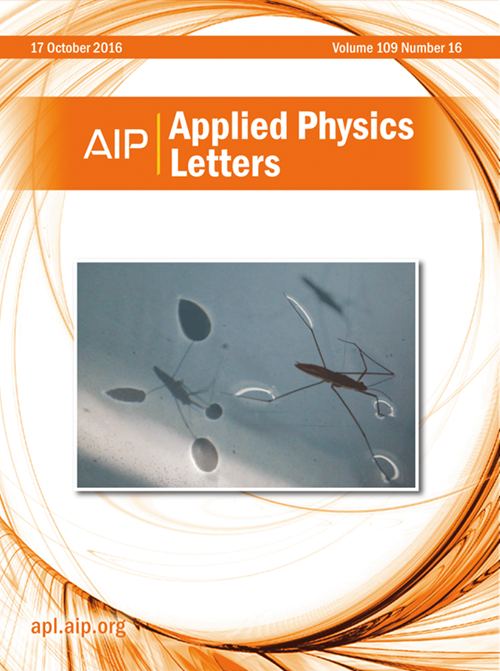利用原子层沉积技术制备半导体-金属无过渡热通量测定膜
IF 3.6
2区 物理与天体物理
Q2 PHYSICS, APPLIED
引用次数: 0
摘要
在这项研究中,我们研究了brookite相钒(IV)氧化物(VO2)薄膜的形成,重点研究了它们在无半导体到金属转变(SMT)行为的热测膜中的潜在应用。采用原子层沉积(ALD)技术,通过改变沉积温度(140 ~ 250℃)来控制VO2薄膜的结晶。x射线衍射(XRD)和x射线光电子能谱(XPS)分析表明,在250℃沉积的薄膜主要结晶成brookite相,而较低温度沉积的薄膜则形成单斜相VO2,并发生SMT行为。电学测量表明,在250°C下沉积的薄膜具有优异的热量学性能,具有稳定的温度电阻系数(TCR)和最小的1/f噪声,即使在热应力测试之后也是如此。相比之下,单斜相含量较高的薄膜表现出明显的SMT行为,性能下降。这些结果表明,没有SMT行为的brookite相VO2薄膜是高性能微热计应用的有希望的候选者。本文章由计算机程序翻译,如有差异,请以英文原文为准。
Brookite-phase vanadium (IV) oxide formation for semiconductor-to-metal transition free bolometric membrane via atomic layer deposition technique
In this study, we investigated the formation of brookite-phase vanadium (IV) oxide (VO2) thin films, focusing on their potential application in bolometric membranes without semiconductor-to-metal transition (SMT) behavior. Using atomic layer deposition (ALD), we controlled the crystallization of VO2 thin films by varying the deposition temperature from 140 to 250 °C. X-ray diffraction (XRD) and x-ray photoelectron spectroscopy (XPS) analyses revealed that films deposited at 250 °C predominantly crystallized into the brookite phase, while lower temperatures led to monoclinic-phase VO2, which undergoes SMT behavior. Electrical measurements showed that films deposited at 250 °C demonstrated superior bolometric properties with a stable temperature coefficient of resistance (TCR) and minimal 1/f noise, even after thermal stress testing. In contrast, films with higher monoclinic-phase content exhibited significant SMT behavior and degraded performance. These results suggest that brookite-phase VO2 films, free from SMT behavior, are promising candidates for high-performance microbolometer applications.
求助全文
通过发布文献求助,成功后即可免费获取论文全文。
去求助
来源期刊

Applied Physics Letters
物理-物理:应用
CiteScore
6.40
自引率
10.00%
发文量
1821
审稿时长
1.6 months
期刊介绍:
Applied Physics Letters (APL) features concise, up-to-date reports on significant new findings in applied physics. Emphasizing rapid dissemination of key data and new physical insights, APL offers prompt publication of new experimental and theoretical papers reporting applications of physics phenomena to all branches of science, engineering, and modern technology.
In addition to regular articles, the journal also publishes invited Fast Track, Perspectives, and in-depth Editorials which report on cutting-edge areas in applied physics.
APL Perspectives are forward-looking invited letters which highlight recent developments or discoveries. Emphasis is placed on very recent developments, potentially disruptive technologies, open questions and possible solutions. They also include a mini-roadmap detailing where the community should direct efforts in order for the phenomena to be viable for application and the challenges associated with meeting that performance threshold. Perspectives are characterized by personal viewpoints and opinions of recognized experts in the field.
Fast Track articles are invited original research articles that report results that are particularly novel and important or provide a significant advancement in an emerging field. Because of the urgency and scientific importance of the work, the peer review process is accelerated. If, during the review process, it becomes apparent that the paper does not meet the Fast Track criterion, it is returned to a normal track.
 求助内容:
求助内容: 应助结果提醒方式:
应助结果提醒方式:


